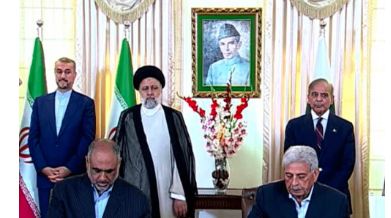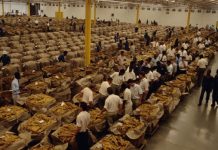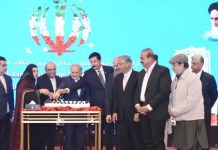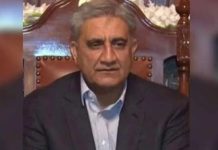ISLAMABAD, APR 22 – Iran and Pakistan decided on Monday to increase the trade volume between the two countries to $10 billion, Iranian President Ebrahim Raisi said, saying that the existing volume was “not acceptable”.
Raisi made the remarks during a joint address with Prime Minister Shehbaz Sharif, after the two held a meeting in Islamabad following the Iranian president’s arrival in Pakistan on a three-day official visit — the first of its kind by any head of state after the February 8 general elections.
Raisi said: “We are committed to strengthening relations at high levels. […] Economic and trade volume between Iran and Pakistan is not acceptable. We have decided as a first step to increase trade volume between our two countries to $10bn.”
Meanwhile, addressing the joint press conference, PM Shehbaz called for strengthening Pak-Iran ties despite challenges: “We have to keep this relationship strong despite the challenges we both face.”
The premier said that the two leaders had detailed discussions on “religious, cultural, diplomatic, investment, and security matters” during their meeting.
The prime minister, calling Raisi an “ocean of political intelligence and wisdom”, and said Iran would progrss further under his leadership.
“Pakistan and Iran can prosper and our borders can see progress,” the prime minister said, expressing hope that the shared border can adapt for trade and business.
PM Shehbaz further expressed hope for the relationship between the neighbours to be “firm and stable”, noting that today was an opportunity to “make this friendship a happy and prosperous one”.
The prime minister also said in Farsi: “Our eyes cooled down, heart became joyful after seeing you.” He also recited a verse by Persian poet Mohammad-Taqi Bahar.
In their meeting, PM Shehbaz and Raisi agreed on joint efforts to eradicate terrorism, state-run Radio Pakistan reported. The two leaders also held discussions to increase trade and communication links between their countries, the report added.
PM Shehbaz was quoted as saying that the entire nation welcomed the Iranian president’s visit while Raisi expressed gratitude to the premier for the warm welcome accorded to him, Radio Pakistan said.
Earlier, Foreign Minister Ishaq Dar called on the Iranian president in Islamabad, where they discussed bilateral relations as well as regional and global developments, Radio Pakistan reported.
Raisi and Dar “emphasised the importance of enhanced efforts to further consolidate bilateral relations in diverse fields”, the report said, adding that the two leaders also “affirmed commitment to peace and constructive dialogue for resolving regional challenges”.
Foreign Minister Ishaq Dar meets Iranian President Ebrahim Raisi in Islamabad. — PID
The Foreign Office (FO) had stated earlier that Raisi would visit Lahore and Karachi and meet with the provincial leadership.
It should be mentioned that the Sindh government has announced a public holiday on April 23 (Tuesday) in the Karachi division to “avoid inconvenience to the general public” upon the visit of foreign dignitaries.
Raisi’s arrival
Iranian President Ebrahim Raisi arrives in Pakistan on a three-day official visit. — DawnNewsTV
Raisi arrived at the Islamabad airport and was received by Housing Minister Mian Riaz Hussain Pirzada and Pakistan’s Ambassador to Iran Mudassir Tipu, the FO said.
“The Iranian president is accompanied by his spouse and a high-level delegation comprising the foreign minister and other members of the cabinet and senior officials,” it said.
Iran’s news agency IRNA said that Raisi’s visit was taking place at the invitation of President Asif Ali Zardari.
“President Raisi will visit several Pakistani cities to meet with a number of ulema, elites and business persons there. A visit to Lahore, the cultural heart of Pakistan, is also among the president’s plans,” it said.
Iranian President Ebrahim Raisi at the Prime Minister’s House alongside Prime Minister Shehbaz Sharif. — DawnNewsTV
Shortly after reaching the country, the Iranian president arrived at the Prime Minister’s House where he was received by Prime Minister Shehbaz Sharif. He was presented with a guard of honour and anthems of both countries were also played on the occasion.
Later, the two also planted a tree in a lawn at the Prime Minister’s House to mark International Earth Day.
According to Radio Pakistan, the two leaders would also participate in a ceremony regarding naming a highway in Islamabad as Iran Avenue. It said that the two would also hold a press talk, adding that the prime minister would also host a lunch for the Iranian president and his delegation.
Significance of visit
Raisi’s visit to Pakistan had been in doubt as Middle East tensions rose after Iran launched an unprecedented missile and drone attack on Israel a week ago in retaliation for an airstrike on the Iranian consular building in Damascus earlier this month. Then, on Friday, central Iran received what was presumed to be an Israeli attack.
Tehran has played down the apparent Israeli attack and indicated it had no plans for retaliation, a response that appeared gauged towards keeping the conflict in Gaza from expanding to a regionwide conflict.
Pakistan has called on all parties in the Middle East to “exercise utmost restraint and move towards de-escalation”.
Raisi’s visit is also significant as Pakistan and Iran seek to mend ties after tit-for-tat missile strikes in January. The cross-border strikes stoked regional tensions already inflamed by Israel’s military offensive in Gaza.
Tehran carried out the strikes against an anti-Iran group in Pakistan the same week it targeted Iraq and Syria. Pakistan responded with a raid on “militant targets” in Sistan-Balochistan province. Both countries have accused each other of sheltering militants in the past.
Pakistan is also counting on a joint gas project with Iran to solve a long-running power crisis that has sapped its economic growth.
A $7.5 billion Iran-Pakistan gas pipeline intended to feed Pakistani power plants was inaugurated with great fanfare in March 2013. But the project immediately stagnated following international sanctions on Iran.
Tehran has built its own section of the 1,800-kilometre pipeline, which should eventually link its South Pars gas fields to Nawabshah.
In February, the outgoing caretaker government in Pakistan approved the construction of an 80km section of the pipeline, primarily to avoid the payment of billions of dollars in penalties to Iran due to years of delays.
Washington has warned that Pakistan could face US sanctions, saying it does not support the pipeline going forward.












